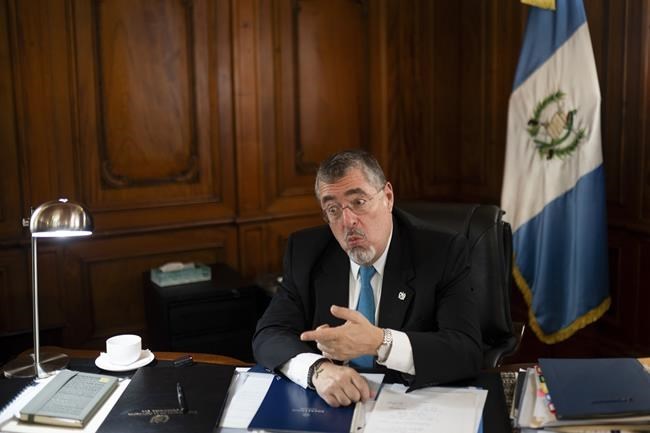
Guatemalan President Bernardo Arevalo gestures during an interview at the National Palace in Guatemala City, Thursday, June 20, 2024. (AP Photo/Santiago Billy)
June 20, 2024 - 7:32 PM
GUATEMALA CITY (AP) — Guatemala President Bernardo Arévalo says opposition in the Congress and the Attorney General's Office have made it difficult to implement the change he seeks for the Central American nation which he found “semi-destroyed” when he took office almost six months ago.
The politician from the progressive Seed Movement party was elected in August after voters angry at widespread corruption and leaders’ failure to tackle it made a decisive choice for change, elevating his long shot candidacy.
Central America’s most populous country and the region’s largest economy continues to struggle with poverty and violence that have driven hundreds of thousands of Guatemalans to migrate to the U.S.
“What has impacted me the most is seeing how corruption has impacted the executive capacity of all the country’s institutions; the levels of abandonment and dysfunctionality of the institutions are terrible,” Arévalo said Thursday in an interview with The Associated Press.
Arévalo and his Seed Movement party posed a threat to those who have long wielded power in Guatemala. Guatemalan prosecutors tried to prevent Arévalo from taking office in early January.
Arévalo said he understands that Guatemalans want quick responses to the promises he made in his political campaign, and when they are delayed the public grows frustrated.
The promises focused on cleaning up corruption and expelling Attorney General Consuelo Porras from the Public Ministry, although Porras remains in office today.
Porras was legally selected by unpopular former Guatemalan President Alejandro Giammattei for a second four-year term ending in 2026.
She has criminalized political opponents such as the Seed Movement party, journalists, and exiled former prosecutors and judges who reported being persecuted for having investigated acts of corruption.
Porras has been sanctioned by the U.S. government and 40 other countries for hindering the anti-corruption fight and undermining the country’s democracy. Arévalo said he would not remove her by force.
“We have a fundamental commitment to the democratic system and we are not going to resort to non-democratic measures to rescue democracy,” Arévalo said. The most extreme voices have called for Arévalo to use the army or the police to oust Porras.
Arévalo also holds Porras responsible for delaying investigations in different corruption cases. His government has filed over 100 complaints.
Porras has denied interfering in corruption cases and refused to step down from her position.
“People would like to see that the corrupt are being punished," Arévalo said. “We take the first step (report)... but it all stops at the Public Ministry, where there is no investigation of complaints.”
Arévalo has made addressing Guatemala's public infrastructure shortcomings a priority and said his administration had made some progress. “People need to see that needs are being met, that health and education are improving,” he said.
His administration has revamped more than 4,000 schools and carried out public infrastructure projects in many of those areas.
He said he plans to meet with outgoing Mexican President Andrés Manuel López Obrador before he leaves office in October and with incoming President Claudia Sheinbaum.
News from © The Associated Press, 2024